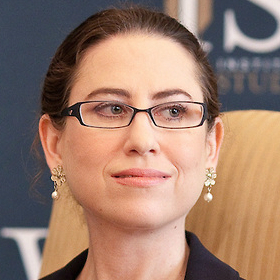Foundations of Grand Strategy
Assess grand strategic theory and practice in Thucydides and Plutarch.
Summer 2017
Washington, DC
Are allies costly or beneficial to a great power? Do they enhance its security or drag it into peripheral and unnecessary wars? What are the advantages and risks of a maritime power? Does a sea power need allies more than a land power? How should it compete with a continental rival? What is the impact of a prolonged conflict on an already fragile social order of a polity? These questions characterize our current debates on U.S. strategy, but they are not new. More than two thousand years ago, Thucydides described with great lucidity the strategic challenges facing a maritime great power, Athens – and they are remarkably relevant to today’s U.S. security dilemmas and strategic choices.
The course will focus on Thucydides’s masterpiece, The Peloponnesian War, and examine a series of strategic challenges, and responses to them. During the weeklong seminar, students will read extended excerpts from Thucydides, focusing on key speeches and moments in the conflict. The course requires careful reading of the text but is not a history class. Rather, by placing themselves in the position of the Thucydidean characters, students will discuss recurrent principles of strategy and the dilemmas facing leaders.
Image: “Slab of the Amazonomachy frieze” by Carole Radato | Flickr, CC BY-SA 2.0
Jakub Grygiel on the geopolitics of Europe

Jakub Grygiel is an Associate Professor at the Catholic University of America. From 2017–18, he was a member of the Policy Planning Staff at the U.S. Department of State. His most recent book is Return of the Barbarians: Confronting Non-State Actors from Ancient Rome to the Present.

Jakub Grygiel is an Associate Professor at the Catholic University of America. From 2017–2018, he was a senior advisor to the Secretary of State in the Office of Policy Planning working on European affairs.
Previously, he was a Senior Fellow at the Center for European Policy Analysis and on the faculty of SAIS-Johns Hopkins University. He has previously worked as a consultant for the OECD in Paris and the World Bank in Washington.
His most recent book is Return of the Barbarians: Confronting Non-State Actors from Ancient Rome to the Present. He is coauthor of The Unquiet Frontier: Rising Rivals, Vulnerable Allies, and the Crisis of American Power (with A. Wess Mitchell) and also the author of Great Powers and Geopolitical Change. His writings on international relations and security studies have appeared in The American Interest, Journal of Strategic Studies, Orbis, Commentary, Joint Forces Quarterly, Political Science Quarterly, as well as U.S., Swiss, Polish and Italian newspapers. He earned a Ph.D., M.A. and an MPA from Princeton University, and a BSFS Summa Cum Laude from Georgetown University.
Readings:
Discussion Questions:
Readings:
Discussion Questions:
Readings:
Discussion Questions:
Readings:
Discussion Questions:
Readings:
Discussion Questions:

Hugh Liebert

Jakub J. Grygiel
Jakub Grygiel is an Associate Professor at the Catholic University of America. From 2017–18, he was a member of the Policy Planning Staff at the U.S. Department of State. His most recent book is Return of the Barbarians: Confronting Non-State Actors from Ancient Rome to the Present.
Christopher Walker
Christopher Walker is Vice President for Studies and Analysis at the National Endowment for Democracy. Prior to joining the NED, Walker was Vice President for Strategy and Analysis at Freedom House.

Gary Schmitt
Gary J. Schmitt is a senior fellow in the Social, Cultural, and Constitutional Studies program at the American Enterprise Institute (AEI), where he studies issues related to the American presidency, the U.S. constitution and its principles, and American civic life.

Thomas Donnelly
Thomas Donnelly, a defense and security policy analyst, is the co-director of the Marilyn Ware Center for Security Studies at AEI. From 1995 to 1999, he was policy group director and a professional staff member for the House Committee on Armed Services.

Donald Kagan
Donald Kagan was the Sterling Professor Emeritus of Classics and History at Yale University. His four-volume History of the Peloponnesian War is the leading scholarly work on the subject. He was also the author of many books on ancient and modern topics, including On the Origins of War and the Preservation of Peace.

James M. Dubik
LTG James M. Dubik (U.S. Army, Ret.) is a Senior Fellow at the Institute for the Study of War and a Professor at Georgetown University’s Security Studies Program. General Dubik has extensive operational experience in Iraq, Afghanistan, Japan, Korea, Thailand, Bosnia, Haiti, Panama, Honduras, and in many NATO countries.

Frederick W. Kagan
Frederick W. Kagan is a Senior Instructor with the Hertog War Studies Program at the Institute for the Study of War. The author of the 2007 report “Choosing Victory: A Plan for Success in Iraq,” he is one of the intellectual architects of the successful “surge” strategy in Iraq. He is the director of AEI’s Critical Threats Project.

Kimberly Kagan
Kimberly Kagan is a Senior Instructor with the Hertog War Studies Program and founder and president of the Institute for the Study of War. She is a military historian who has taught at the U.S. Military Academy at West Point, Yale, Georgetown, and American University.